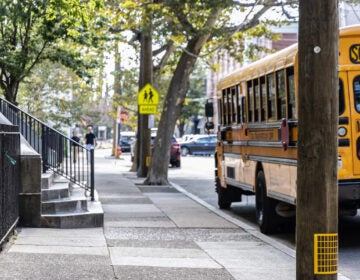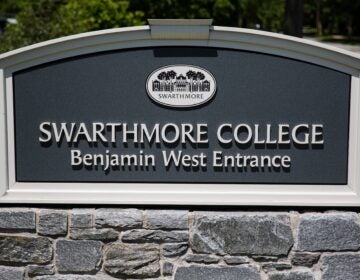Temple joins growing list of schools making standardized tests optional for applicants

Temple University will make standardized test scores optional for admission. (NewsWorks file photo)
Nervous test-takers, fear not. Temple University announced Tuesday it will join the growing list of colleges ditching the SAT as an entrance requirement.
The university calls it the “Temple Option,” describing it as “an admissions path for talented students who show great potential for success but don’t perform well on standardized tests.”
The university says the move is in line with its goal of placing more emphasis on noncognitive “grit factors.”
“By giving students more choices, we open doors to more first-generation students and those from underserved communities whose enormous academic promise may be overlooked by conventional measures of achievement,” said Temple President Neil Theobald in an official release.
With this move, Temple becomes the first national public research university in the Northeast to make test scores optional for admission.
“There are just lots of talented students out there who are being disadvantaged because of the sole reliance on SAT as the sometimes determining factor in their admission,” said William Black, Temple’s senior vice provost for enrollment management, in a telephone interview.
Considering other measures of a student
Black says this will help kids whose high school success isn’t reflected in standardized scores.
As an example, Black referenced a recent Temple student who had attended a Philadelphia School District high school. She took all advanced placement courses, had 3.86 GPA, spoke five languages, and yet scored only an 820 on the SAT.
“Those are the kinds of students that we want to find,” Black said. “We know that they can succeed at Temple.”
Black said students who choose not to submit scores should have “at least in the neighborhood of a 3.5 GPA” and be “probably in the top 10 or 15 percent of their class.”
“We’re looking for those attributes that really point to success factors,” he said. “We want to develop that potential.”
If students choose not to submit test scores, they must answer four short self-reflective essay questions.
Prior to this initiative, Black said, students with SAT scores at the 900-1000 level or below “were in trouble.”
This initiative makes official an ideology that Temple says it’s been practicing informally for years for students whose standardized test scores dipped well below high school success rates.
“What we have found in our data is that if these students had a 3.5, or 3.6, etc., in high school, they’re having that same GPA here at Temple,” Black said.
Philly schools chief salutes decision
The option will be open to applicants nationally, but Temple expects the move will predominantly attract first-generation college students from under-resourced neighborhoods in Philadelphia.
Black said the change was part of a broader strategy “in using noncognitive factors, not just in qualifying students for admission, but to strengthen their educational experience here at Temple.”
A portion of the $225,000 Bill and Melinda Gates Foundation “transition” grant that is facilitating this overall change will be used to provide guidance to students admitted without test scores.
Philadelphia School District Superintendent William Hite lauded the move.
“I’m elated and celebrating the fact that Temple is doing that,” he said in a telephone interview. “I think it provides new opportunities for the children in this city who may have the skills and abilities, but may not have the access to the things like SAT prep and ACT prep.”
Hite said the move aligns with his vision for the school district’s future, which includes a greater emphasis on project-based learning, which he says, is “not captured as a part of a static assessment.”
Trend gaining traction
Nationally, about 30 percent of undergraduate schools allow students to forgo standardized test requirements such as the SAT and ACT.
Bryn Mawr College announced last week that it would make the test optional; St. Joseph’s University did so last year.
A study released this year by the National Association of College Admission Counseling found little difference in college GPAs and graduation rates between students who submitted SAT scores and those who didn’t.
Temple received more than 27,000 applications last year and will enroll 4,500 freshmen this fall.
Black said he’d be very happy if 10 percent of applicants for fall 2015 utilize the Temple Option, but would be “happier if we get 20 percent.”
Student-athletes, home-schooled students and international students who have studied in a U.S. high school for fewer than three years will be required to submit standardized test scores.
If this option had been in place this year, Black said, it would have qualified an additional 150 students.
Once students choose to submit or exclude their test scores, they will not be able to change their selection.
WHYY is your source for fact-based, in-depth journalism and information. As a nonprofit organization, we rely on financial support from readers like you. Please give today.





